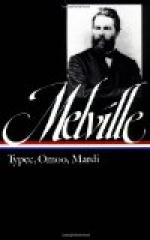“Your pardon,” said Mohi, “for beshrew me, they are not yet all cut. At threescore and ten, here have I a new tooth coming now.”
“Old man! it but clears the way for another. The teeth sown by the alphabet-founder, were eye-teeth, not yet all sprung from the soil. Like spring-wheat, blade by blade, they break ground late; like spring-wheat, many seeds have perished in the hard winter glebe. Oh, my lord! though we galvanize corpses into St. Vitus’ dances, we raise not the dead from their graves! Though we have discovered the circulation of the blood, men die as of yore; oxen graze, sheep bleat, babies bawl, asses bray—loud and lusty as the day before the flood. Men fight and make up; repent and go at it; feast and starve; laugh and weep; pray and curse; cheat, chaffer, trick, truckle, cozen, defraud, fib, lie, beg, borrow, steal, hang, drown—as in the laughing and weeping, tricking and truckling, hanging and drowning times that have been. Nothing changes, though much be new-fashioned: new fashions but revivals of things previous. In the books of the past we learn naught but of the present; in those of the present, the past. All Mardi’s history—beginning middle, and finis—was written out in capitals in the first page penned. The whole story is told in a title-page. An exclamation point is entire Mardi’s autobiography.”
“Who speaks now?” said Media, Bardianna, Azzageddi, or Babbalanja?”
“All three: is it not a pleasant concert?”
“Very fine: very fine.—Go on; and tell us something of the future.”
“I have never departed this life yet, my lord.”
“But just now you said you were risen from the dead.” “From the buried dead within me; not from myself, my lord.”




